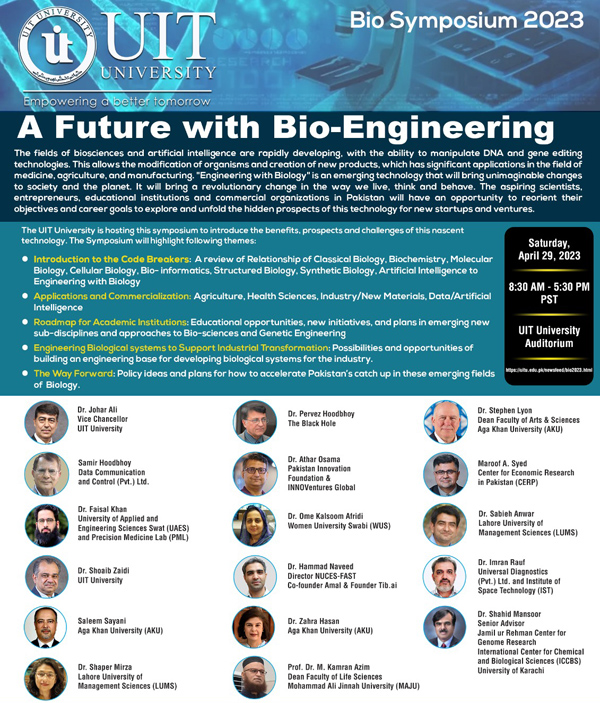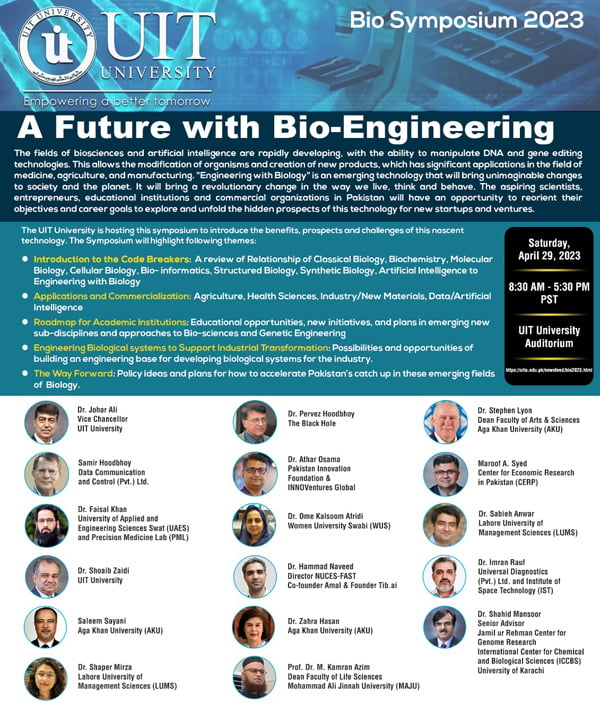Karachi: A one-day excellent seminar named ‘A Future Bioengineering’ was held at Usman Institute of Technology University (IUTU) in Karachi, in which experts, scientists, CEs of start-up companies from all over Pakistan presented very important papers. did
The aim of the event was to discuss the latest trends and collaborations in biology in agriculture, health, industry and other fields. Then the participants discussed bioengineering, genetic technology and industrial applications in the context of the 21st century.
Parvez Hudbhai, Sameer Hudbhai, Dr. Athar Osama, Dr. Zahra Hasan, Dr. Shahpar Mirza, Dr. Stephen Line, Dr. Johar Ali, Dr. Sabih Anwar and Dr. Umi Kulsoom spoke in this seminar.
UIT University organized a one-day symposium on Future of Bioengineering. In which a large number of experts and researchers from the field of biology, people associated with education and research, vice chancellors of universities, people from industries, students of major universities across Pakistan and experts in this field. attended In the symposium, experts in the field of biology and engineering discussed the current situation and future prospects of the changes taking place around the world.
Chancellor UIT University Hussain Hisham said that the world is undergoing rapid change, realizing this change, UIT University has invited eminent scientists from all over the country to comment on new emerging fields.

Vice Chancellor of UIT University, Dr. Johar Ali said that James Watson and Francis Crick published a short research paper on the structure and details of DNA, after which there was a revolution in the field of genetics and DNA is a book of life. It started to open in front of us. Then the human genome was read and we got to Crisper technology.
Two main models for Pakistani development
Talking about self-sufficiency, local resources and industrial development, Dr. Athirusamah, the spirit of Pakistan Innovation Foundation and science policy expert, said that we should develop technology tools and better products at the local level. He said that the amount of goods that an American company Wal-Mart buys from China is helping to provide employment to 5 million people in China. On the other hand, he gave the example of India that in 2005, he conducted a study and found that there were hardly 8 lakh developers behind India’s $19 billion software exports at that time. Pakistan needs to work on both these models.
Opportunities and pitfalls of genetic engineering
After that, the head of Center for Economic Research Pakistan (CERP), Maruf Syed, discussed the challenges and potential opportunities in bioengineering in the country. He also reviewed the adverse effects of climate change on agriculture and gross national production in the country. However, genetic engineering can not only create climate-resistant crops and commodities, but proteins and other essential components can also be added to them.
Molecular diagnosis of diseases
In the first technical session, while discussing the diagnosis of diseases at the molecular level, Dr. Zahra Hassan, associated with the Aga Khan University, said that genetic sciences have paved new ways to identify and treat diseases. He also mentioned the vaccine being developed in the context of the Covid-19 virus epidemic.
After that, Dr. Shahpar Mirza associated with Lahore University of Management Science (LUMS) presented his research on the important relationship of microbiology in public health.
Computing, AI and Pharmaceuticals
Dr. Hamad Naveed, affiliated with the computer science laboratory of FAST University, presented his research on artificial intelligence and data in pharmaceuticals. He said that medical images, samples and artificial intelligence (AI) are helping in the diagnosis of diseases. On the other hand, data has been very helpful for us in this regard. Even new molecules, compounds and protein folding processes are being understood with AI and computational technology.
He said that breast cancer is increasing rapidly in Pakistan, which can be diagnosed with the help of AI, on which he has also done valuable work in Pakistan.
Addressing the second technical session, Pakistan’s prominent scientist Dr. Pervez Hudbhai said that by examining the four molecules of DNA i.e. A, G, T, C as binary numbers i.e. zero and one, we have done DNA computing. moving towards He also mentioned the difficulties and obstacles in higher education in the country.
After this, Dr. Stephen Line, Dean of the Faculty of Arts and Science at Aga Khan University, has said that research institutions have to keep in mind the market and its demands along with their products. He said that science can solve your problems to a certain extent, but for its best solution, scientific method, sociology and its results are also necessary to study carefully.
Digital Geology and Our Old Curriculum
DNA details can now be edited, copied and pasted like a text file, said Dr Faisal Khan, head of the ‘Precision Medicine Laboratory’ at the University of Engineering and Technology in Swat.
Giving a practical example of bioengineering, he said that in the past, insulin was distilled from the pancreas of pigs to produce insulin on a large scale for diabetic patients, and now the same work is being done by genetically modified bacteria.
He urged the Higher Education Commission (HEC) to review the curriculum, especially in biological sciences, which is actually several decades old. Dr. Faisal said that the day is not far when bio-electronics will be common. He also talked about the research done by his institution and its awareness among the students.
The need for a new approach in education
Dr. Umi Kulsoom Afridi, associated with Women’s University, Swabi, has said in her presentation that there is a need to introduce new methods of teaching for students in which students themselves can participate. He also mentioned similar initiatives taken in Women University, Swabi.
Prospects of Electronic Chip Manufacturing in Pakistan
Dr. Shoaib Zaidi, associated with UIT University, gave the happy news that UITU students won two Open Source Electronic Chip Designing competitions in just a few years and then the “Google Summer of Code” competition in Jamia. was held.
He said that if Pakistan itself cannot make electronic ICs or chips on its own soil, then we should try to design the best chips, because according to the agreement, a significant share of the profits of chip making, i.e. 51 percent, goes to the experts who design the chips. is given
Universities and Technology
Physicist of Lahore University of Management Science (LUMS), prominent expert associated with Khwarazmi Science Society, Dr. Sabih Anwar, said in his passionate speech that mathematics students in LUMS have to study some biology courses. In this way, multi-disciplinary (multi-disciplinary) method of education has been promoted.
In this way, the teaching of computational and systems biology is also going on. He emphasized that the awareness of science has to be brought to every special public. What is the fault of the students of Madrasas that they are kept away from science? He expressed concern about the three crore children in the country who are not going to any kind of school and madrasa and such a large population is indifferent to knowledge.
He has mentioned a scientific instrument making laboratory organized by Limz where necessary scientific instruments of all levels have been manufactured locally. They also have a 3D printer called Markhor which costs only Rs 15000.
After that, Dr. Muhammad Kamran Azim of Muhammad Ali Jinnah University gave a detailed discussion on DNA sequencing and its applications. Later, a third session was also organized on the promotion and opportunities of bioengineering in the country.
(function(d, s, id){
var js, fjs = d.getElementsByTagName(s)[0];
if (d.getElementById(id)) {return;}
js = d.createElement(s); js.id = id;
js.src = “//connect.facebook.net/en_US/sdk.js#xfbml=1&version=v2.3&appId=770767426360150”;
fjs.parentNode.insertBefore(js, fjs);
}(document, ‘script’, ‘facebook-jssdk’));
(function(d, s, id) {
var js, fjs = d.getElementsByTagName(s)[0];
if (d.getElementById(id)) return;
js = d.createElement(s); js.id = id;
js.src = “//connect.facebook.net/en_GB/sdk.js#xfbml=1&version=v2.7”;
fjs.parentNode.insertBefore(js, fjs);
}(document, ‘script’, ‘facebook-jssdk’));



